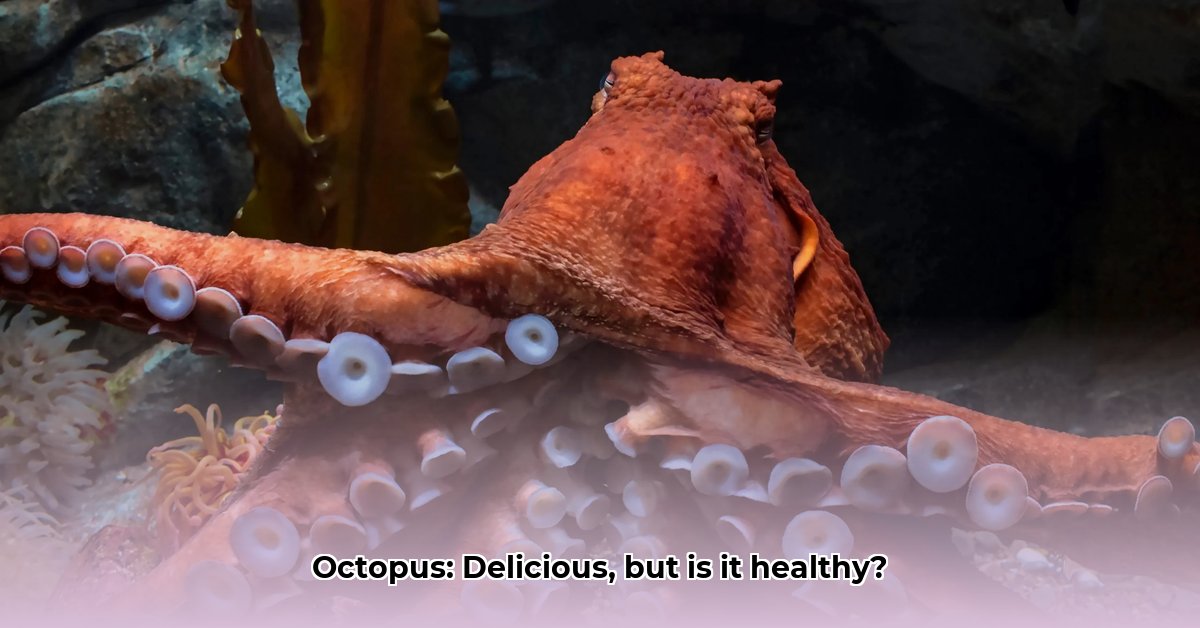Thinking about trying octopus? It’s a unique seafood with some interesting nutritional perks, but like anything, there’s a bit more to the story than just “good” or “bad.” For comparison, you might also consider learning about the health aspects of other meats, like checking out this guide on [chicken skin health](https://chaztin.com/is-chicken-skin-healthy). This guide breaks down everything you need to know about eating octopus – the good, the bad, and how to make sure you’re enjoying it safely and smartly. We’ll cover what’s good for you in octopus, what potential downsides to watch out for, and give you practical tips on preparing and cooking it so you can add it to your diet confidently. We’ll even help you make informed choices about where to buy it and how to make delicious and healthy meals with it. Let’s dive in and explore this fascinating seafood together!
Is Octopus Healthy? Lean Protein, Omega-3s, and More
So, is octopus a healthy food choice? It’s a great question, and the answer, like with most foods, is nuanced. It’s about understanding the benefits, acknowledging the risks, and making informed decisions. Let’s explore the nutritional profile, potential upsides, and possible downsides of incorporating octopus into your diet.
Octopus: A Nutritional Powerhouse – Unveiling Its Secrets
Octopus stands out as a fantastic source of lean protein, providing a substantial amount of protein with a relatively low fat content. This makes it an excellent choice for individuals focused on weight management or muscle building. Beyond protein, octopus is rich in omega-3 fatty acids, particularly EPA (eicosapentaenoic acid) and DHA (docosahexaenoic acid), recognized for their heart-healthy properties and potential cognitive benefits. These “good fats” are linked to reduced inflammation and improved brain function.
Furthermore, octopus delivers a significant dose of vitamin B12, crucial for maintaining healthy nerve function and red blood cell production. It also provides essential minerals like selenium, iron, copper, magnesium, and potassium, each playing a vital role in various bodily functions. Selenium, for example, acts as a powerful antioxidant, protecting cells from damage. Don’t forget taurine, an amino acid with potent antioxidant properties that further helps protect your cells.
Here’s a more detailed breakdown of the nutritional content per 3-ounce (85-gram) serving of cooked octopus:
- Calories: Approximately 140
- Protein: 25 grams
- Fat: 2 grams
- Carbohydrates: 4 grams
- Vitamin B12: Significantly exceeds the Daily Value (DV)
- Selenium: High percentage of the DV
- Copper: Good source
- Iron: Provides a notable amount
Sounds impressive, doesn’t it? However, it’s essential to consider the other side of the story.
The Other Side of the Coin: Potential Risks – Navigating the Downsides
While octopus offers considerable nutritional advantages, it’s important to be mindful of potential drawbacks. One concern is its cholesterol content; a 3-ounce serving contains a notable amount. While the impact of dietary cholesterol on blood cholesterol levels continues to be researched, health experts generally advise moderation.
The sodium content can also be relatively high, depending on the preparation method. This is especially relevant if you’re monitoring your salt intake for blood pressure control. Individuals with hypertension or those sensitive to sodium should be cautious.
Allergic reactions are another consideration. Shellfish allergies are among the most common food allergies, so caution is advised for individuals with a history of such allergies. Cross-reactivity is possible, meaning if you’re allergic to shrimp or crab, you might also be allergic to octopus.
Finally, there’s the potential for heavy metal contamination, including mercury, arsenic, and cadmium. The levels of these contaminants can vary based on the octopus’s origin and environmental factors. Older octopus tend to have more concentration of heavy metals. This risk requires careful consideration and informed choices.
Making Smart Choices: Your Octopus Consumption Guide – A Practical Approach
To enjoy octopus while maximizing its benefits and minimizing potential risks, consider these guidelines:
-
Choose Your Octopus Wisely: Opt for octopus that’s sustainably sourced from reputable suppliers. Look for certifications like the Marine Stewardship Council (MSC) to ensure environmentally responsible fishing practices. Supporting sustainable fisheries helps protect marine ecosystems and ensures a healthy seafood supply for future generations. Choosing sustainably sourced seafood is an investment in ocean conservation.
-
Cooking Methods Matter: Prioritize cooking methods that minimize sodium intake. Grilling, baking, steaming, or boiling are healthier alternatives to frying, which adds extra fat and sodium. Experiment with herbs, spices, and citrus to enhance flavor without relying on excessive salt. Steaming or poaching generally preserve nutrients and minimize added fats.
-
Portion Control is Key: Moderation is crucial, as with any food. Include octopus as part of a balanced diet, enjoying it occasionally rather than making it a daily staple. A 3-4 ounce serving is generally considered a reasonable portion. Incorporating octopus into your diet on a weekly or bi-weekly basis is a practical approach.
-
Shellfish Allergy Awareness: If you have a shellfish allergy, exercise extreme caution. Introduce a small portion and monitor for allergic reactions like hives, itching, swelling, or difficulty breathing. Seek immediate medical attention if any reaction occurs. Consult an allergist for guidance if you have a shellfish allergy and wish to try octopus.
-
Stay Informed About Contamination: Be mindful of the potential for heavy metal contamination. Inquire with your supplier about the source of their octopus and any testing procedures they use to ensure safety. Transparency from suppliers is a positive sign of commitment to quality and safety. Choose octopus harvested from regions with low pollution levels.
Sustainable Seafood: Our Shared Responsibility – Protecting Our Oceans
Choosing sustainably sourced seafood is not only about personal health but also about the well-being of our planet. By selecting responsibly caught octopus and advocating for clear labeling and rigorous testing, we contribute to ensuring that this delicious and nutritious seafood remains a safe and enjoyable part of our diets for generations. Unsustainable fishing practices threaten marine biodiversity and can disrupt entire ecosystems.
Weighing the Pros and Cons: Octopus in Your Diet – A Balanced Perspective
Here’s a summary of the advantages and disadvantages to help you make an informed decision about including octopus in your diet:
| Pros | Cons |
|---|---|
| Excellent source of lean, high-quality protein, crucial for muscle building and repair. | Contains a notable amount of cholesterol, requiring moderation for those monitoring cholesterol levels. |
| Rich in heart-healthy omega-3 fatty acids (EPA and DHA), supporting cardiovascular health and cognitive function. | Can be relatively high in sodium, particularly depending on preparation methods, posing a concern for individuals with hypertension. |
| Good source of vitamin B12, essential for nerve function and red blood cell production, as well as various essential minerals. | Carries a risk of allergic reactions, especially for individuals with known shellfish allergies. |
| May offer cognitive benefits due to omega-3 fatty acids and other nutrients, with ongoing research exploring potential benefits. | Potential for heavy metal contamination (mercury, arsenic, cadmium), which varies depending on sourcing and environmental factors. |
| Versatile and delicious in many different cuisines, allowing for diverse culinary applications. | Ethical considerations surrounding octopus farming and harvesting practices, prompting discussions about animal welfare. |
Important Note: The information provided in this guide is for general knowledge and informational purposes only, and does not constitute medical advice. Consult with a qualified healthcare professional or registered dietitian before making any dietary changes or if you have concerns about incorporating octopus into your diet. They can provide personalized guidance based on your individual health needs and preferences. Ongoing research continues to refine our understanding of the health impacts of various foods, so stay informed and maintain an open mind.
How to Choose Sustainably Sourced Octopus to Minimize Heavy Metal Contamination – A Step-by-Step Guide
Key Takeaways:
- Octopus is a nutritious protein source, rich in omega-3s and other beneficial nutrients, but potential heavy metal contamination is a critical concern.
- The level of contamination varies significantly depending on location, fishing practices, and the age of the octopus.
- Choosing sustainably sourced octopus to minimize heavy metal contamination is essential for safe consumption and environmental responsibility.
- Sustainable fisheries prioritize responsible harvesting methods that minimize environmental impact and ensure the long-term health of octopus populations.
- Consumers can make informed choices by supporting sustainable seafood initiatives and selecting responsibly sourced octopus from trusted suppliers.
Understanding the Risks: Heavy Metals and Octopus – What You Need to Know
Let’s be honest: we all desire food that is both delicious and nourishing. Octopus certainly boasts an appealing nutritional profile, but there’s a potential caveat. Some octopus specimens may harbor elevated levels of heavy metals like mercury and lead. The octopus’s habitat and the harvesting methods employed significantly influence this contamination. Envision the octopus as a sponge, absorbing elements from its surrounding environment. Pollution in the waters translates to a potentially tainted meal.
So, how can we navigate this challenge successfully? The key lies in responsible and informed sourcing.
Choosing Sustainable Octopus: A Step-by-Step Guide for Responsible Consumption
Here’s a practical guide to assist you in making informed decisions when purchasing octopus:
- Look for Certifications: Prioritize octopus products bearing certifications such
- Compartment Food Containers Make Meal Prep and Lunch Packing Easy - February 10, 2026
- Divided Lunch Containers Revolutionize Your Meal Prep Strategy - February 9, 2026
- Divided Food Storage Containers Transform Meal Prep and Portion Control - February 8, 2026










